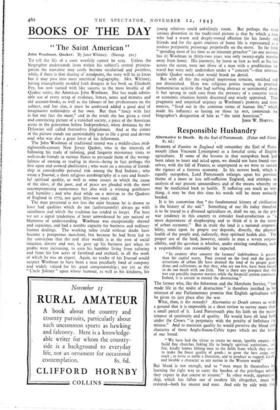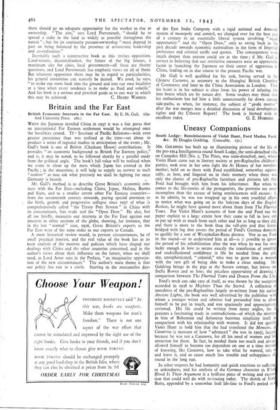Responsible Husbandry
READERS of Famine in England will remember the Earl of Ports- mouth (then Viscount Lymington) as a forceful critic of English agriculture. If some of the lessons in that outspoken book bad been taken to heart and acted upon, we should not have found our- selves, with the fall of France, as unprepared as we were to sustain the rigours of a fortress economy. In his newest book, which is equally outspoken, Lord Portsmouth enlarges upon his previous theme of a more or less self-sufficient England, and attempts an analysis of our present unsoundness and of the means whereby we may be medicined back to health. If suffering can teach us any- thing, it may be that this time his words will be more seriously heeded.
It is his contention that " the fundamental history of civilisation is the history of the soil." Something of our ills today therefore is to be traced to a diseased agriculture or, shall we say, to the pre- war tendency in this country to consider food-production as "a mere department of shopkeeping and to think of it in the terms of urban economy." But in truth the land is a national responsi- bility, since upon its proper use depends, directly, the physical health of the people and, indirectly, their spiritual health also. The proper use of the land, however, entails in man a severe respon- sibility, and the question is whether, under existing conditions, such a responsibility can reasonably be expected.
" In country after country the farmers' indebtedness is greater than his capital assets. Poor reward on the land and the greater attractions of urban life have drained the land of its proper guar- dians and cultivators, so that they, who are too few, have been forced to do too much with too little. Nor is there any prospect that this war can possibly improve matters while the financial system continues. Indeed, st is certain to extend the destruction."
The farmer who, like the fisherman and the Merchant Service, " has made life in the midst of destruction " is therefore justified in his mistrust of any Parliamentary promise that English agriculture will be given its just place after the war.
What, then, is the remedy? Alternative to Death covers so wide a ground that it is impossible in a short review to survey more than a small parcel of it. Lord Portsmouth pins his faith on the main- tenance of continuity and of quality. He would have all land held under the Crown " in perpetuity with the penalty of forfeiture for misuse." And to maintain quality he would preserve the blood and character of those Anglo-Saxon-Celtic. types which are the basis of our breed.
" We have had the virtue to create no mean, ignoble empire ; to build fine churches linking life to homely spiritual aspirations, and fair, kindly homes linking men to the fields from which they rose; to make the finest quality of goods ; to grow the best crops Aid stock ; to write as noble a literature, and to produce as rugged, kindly and lovable a character as any nation in the Western world."
But blood is not enough, and so " men must fit themselves by learning the right way to carry the burden of the privileges which they expect in due course to assume." In other words, apprentice- ship, which has fallen out of modem life altogether, must be restored—both for master and man. And side by side with this
there should go an adequate opportunity for the worker to rise to ownership. " The aim," says Lord Portsmouth, " should be to spread a stake in the land as widely as possible throughout the nation " ; but for its continuity peasant-ownership " must depend in part on being balanced by the presence of aristocratic leadership and co-ordination."
Inevitably such a constructive book as this invites opposition. Land-tenure, decentralisation, the future of the big houses, a maximum size for cities, local government—all these are thorny questions, and Lord Portsmouth has emphatic views on all of them. But whatever opposition there may be in regard to particularities, his general contention can scarcely be denied. We need, he says, " to strike our roots back into the ground and into our own localities at a time when every tendency is to make us fluid and volatile." And his book is a serious and practical guide as to one way in which



























 Previous page
Previous page